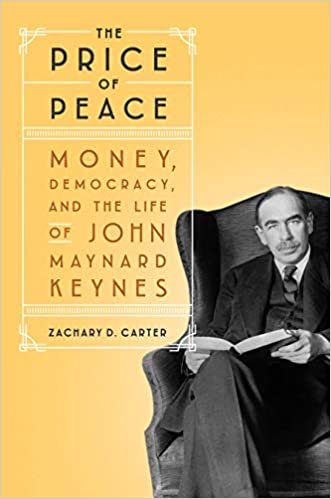You have /5 articles left.
Sign up for a free account or log in.
 The Price of Peace: Money, Democracy, and the Life of John Maynard Keynes by Zachary D. Carter
The Price of Peace: Money, Democracy, and the Life of John Maynard Keynes by Zachary D. Carter
Published in May 2020
One of the questions with which I’m continuously fascinated is that of political-ideological beliefs. Why am I more liberal, and you more conservative? Why am I a Democrat and you a Republican? How can it be, starting from a place of more or less similar experience and intelligence, that I lean left and you lean right?
As a moderate liberal, I’m likely prewired to love The Price of Peace: Money, Democracy, and the Life of John Maynard Keynes. If you identify as a conservative and vote Republican, you might not find this book so terrific. (Although events of the last few months are pushing me back toward the more progressive orientation that I thought I’d mostly left behind in grad school.)
How can that be? The Price of Peace is a deeply researched and stunningly well-written intellectual history of economic thinking in the 20th century. The book is both a biography of the essential economic thinker and actor of the last 100 years, John Maynard Keynes, and the impact his ideas have had on economic policy and the economy.
Perhaps I’m misjudging how conservatives will read this book. I’d like to think that I’d show equal appreciation for a book that is sympathetic to the ideas of Hayek or Friedman or Laffer, if it was written with the skill and erudition of The Price of Peace. Please point me in the direction of these books. (See my review of Keynes Hayek: The Clash that Defined Modern Economics).
One critical area that seems to define the divide between left and right, liberal and conservative, is how we think about the role of government. For the left, the exceptional contribution of Keynes was to provide the theoretical justification for government spending during times of recession or depression (or pandemic or war), even at the cost of both higher taxes and deficits. For the right, the idea that higher taxes and deficit spending can be justified counts as the significant error of Keynesian thinking.
Let’s get very specific. As someone who thinks Keynes was right about the role government should play in times of economic distress, I believe that the federal government should be taking a much more significant role today in countering the economic consequences of COVID-19. The pandemic-caused unemployment should be countered, I believe, with big new government spending programs to put money in the hands of the unemployed. I’d like to see massive infusions of funds to states and municipalities. Huge commitments to infrastructure projects. And yes, billions of new dollars for higher education. Paying for all these investments with new taxes on the wealthy is fine with me. At this moment, I’m also not all that worried about deficits.
Reading The Price of Peace helped me understand where my ideas about the role of government come from. As Keynes himself wrote,
The ideas of economists and political philosophers, both when they are right and when they are wrong, are more powerful than is commonly understood. Indeed the world is ruled by little else. Practical men, who believe themselves to be quite exempt from any intellectual influences, are usually the slaves of some defunct economist. Madmen in authority, who hear voices in the air, are distilling their frenzy from some academic scribbler of a few years back. I am sure that the power of vested interests is vastly exaggerated compared with the gradual encroachment of ideas.
-- The General Theory of Employment, Interest and Money (1936)
The Price of Peace is the best single-volume history I’ve come across that explores the origins and arguments of Keynesian thinking. It places these ideas in the historical, cultural and biographical contexts of the originators and foes of this way of seeing the world. The book’s author, Zachary D. Carter, is sympathetic to the ideas of Keynes. Yet he gives a fair and nuanced hearing to the thinking of those who have spent their careers fighting against the core ideas of Keynesianism.
Of all the thinkers of the past, I would place John Maynard Keynes as my intellectual hero. Reading The Price of Peace illuminates the complexities and complications (including the less sympathetic elements) Keynes and his ideas. The book also enlarges our understanding and appreciation of the role that Keynes has played in shaping how we think about economics, politics and policy.
Even those of you who are deeply opposed to the idea of government playing a central role in economic life will appreciate this thoroughly researched and beautifully written book. After all, the best way to counter your enemy is to know what she or he is thinking.
What books about conservative economic thinking would you recommend?
What are you reading?




